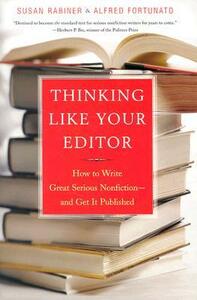Take a photo of a barcode or cover
13 reviews for:
Thinking Like Your Editor: How to Write Great Serious Nonfiction and Get It Published
Alfred Fortunato, Susan Rabiner
13 reviews for:
Thinking Like Your Editor: How to Write Great Serious Nonfiction and Get It Published
Alfred Fortunato, Susan Rabiner
This is quite a good and comprehensive book. I honestly think that the section on writing is advantageous to anyone writing a long form nonfiction project (including a doctoral dissertation). The sections on actual publishing are illuminating, and if I ever get up my gumption to write a trade nonfiction volume I'll be consulting this book again for sure.
Very useful, particularly the information on what to include, and not include, in a submission proposal.
informative
medium-paced
As someone who has never edited or published, I felt like this book did a really good job explaining the process. I found a lot of Rabiner & Fortunato's suggestions for publishing a nonfiction book very beneficial & think they could definitely be helpful in the writing process. The book is a little dated and I would like to have heard more on self publishing, especially because that's a really big thing right now. I also think I could have benefitted more from some compare and contrast to explain things as someone who has not published or edited before.
informative
reflective
medium-paced
Super helpful and easy to follow. I learned a lot about the whole book writing process for serious nonfiction. While this book was published over 20 years ago, it still has fantastic advice and I would recommend it to anyone looking to write a book proposal. Grateful to have this book as a tool in my toolbox!
Thinking Like Your Editor is one of the few books I bought in graduate school that is just as useful then as it is today as an associate professor and a published author. Rabiner says it took her 8 years to deliver under her contract, which is awesome because a) it makes me feel great about my delivery time and b) it made for an awesome book. It’s so concise and honest about a form and style of writing that no one ever teaches you. The two most important lessons—it’s about the audience and the story—nothing else matters as much. Know exactly whom you want to write for and tell a psychological story that carries your argument. I admit to not always thinking in terms of a story but always wanting to be engaged by one. Whether you’re writing serious commercial nonfiction or university press projects, this book is for you. Learn how to structure your arguments within a standard book format. My only critique is that the book is way overdue for a new edition. How books are written may still be the same but how books are published is certainly not.
informative
slow-paced
A bit dated (written in 2003).
But overall solid advice on what editors do. For me the key learnings were:
- Editors care about sales. You need a highly defined audience that will buy your book the moment they hear about it.
- Your serious nonfiction needs to be read in order to get the ideas across. To make sure it's read, make it fun.
- And, clearly define your question then go through your book slowly answering it. Your audience will follow you because they want to know the answer.
But overall solid advice on what editors do. For me the key learnings were:
- Editors care about sales. You need a highly defined audience that will buy your book the moment they hear about it.
- Your serious nonfiction needs to be read in order to get the ideas across. To make sure it's read, make it fun.
- And, clearly define your question then go through your book slowly answering it. Your audience will follow you because they want to know the answer.
So many helpful bits of advice! It is readable and a great guide to not only thinking like an editor, but thinking about argument altogether.
hopeful
informative
inspiring
medium-paced




